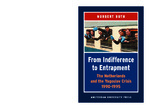From Indifference to Entrapment
The Netherlands and the Yugoslav Crisis, 1990-1995
Abstract
A detailed analysis of the response to the Yugoslav crisis by one of America's key allies in NATO. The author focuses on the question of how a Western bureaucracy faced up to the most complex foreign policy challenge of the 1990s. The Netherlands, as a 'pocket-sized medium power', is an interesting case study. While the margins for Dutch foreign policy are limited, fate had it that the Netherlands occupied the European presidency during the second half of 1991, when the recognition issue divided the West and the parameters for the subsequent international intervention in the Balkans were set. By July 1995, the involvement of the Netherlands had deepened to the extent that Dutch troops who found themselves trapped in the UN safe area of Srebrenica together with the local Muslim population were unable to prevent the worst massacre in Europe since the Second World War. This study is based on interviews with all the major players, including two former Defence Ministers and two former Ministers of Foreign Affairs, and on documents from the Netherlands Ministry of Foreign Affairs, made available under the country's own 'freedom of information act'. A detailed analysis of the response to the Yugoslav crisis by one of America's key allies in NATO. The author focuses on the question of how a Western bureaucracy faced up to the most complex foreign policy challenge of the 1990s. The Netherlands, as a 'pocket-sized medium power', is an interesting case study. While the margins for Dutch foreign policy are limited, fate had it that the Netherlands occupied the European presidency during the second half of 1991, when the recognition issue divided the West and the parameters for the subsequent international intervention in the Balkans were set. By July 1995, the involvement of the Netherlands had deepened to the extent that Dutch troops who found themselves trapped in the UN safe area of Srebrenica together with the local Muslim population were unable to prevent the worst massacre in Europe since the Second World War. This study is based on interviews with all the major players, including two former Defence Ministers and two former Ministers of Foreign Affairs, and on documents from the Netherlands Ministry of Foreign Affairs, made available under the country's own 'freedom of information act'.
Keywords
public administration; geschiedenis; bestuurskunde; political science; politicologie; history, geography, and auxiliary disciplinesDOI
10.5117/9789053564530ISBN
9789053564530OCN
1039278022; 54452827Publisher
Amsterdam University PressPublisher website
https://www.aup.nl/Publication date and place
2000Classification
History
Politics and government


 Download
Download